- Home
- Joel C. Rosenberg
Epicenter 2.0 Page 3
Epicenter 2.0 Read online
Page 3
At the time, I had no idea anything unusual was under way. A literary agent in Manhattan had read the first three chapters of Jihad six months earlier. He was convinced that he could get it published and urged me to finish it as quickly as possible. Given that he worked for the agent who had discovered Tom Clancy back in the early 1980s, I took the advice seriously, working feverishly to get the book done before my savings account ran dry.
As had become my morning ritual, I had breakfast with my wife, Lynn, and our kids, threw on jeans and a T-shirt, and settled down to work on the novel’s second-to-last chapter. I didn’t have radio or television on. I was simply typing away on my laptop when, about an hour later, Lynn burst into the house and turned on the news. She quickly explained that after dropping off two of our kids at school, she had turned on the radio and heard that the World Trade Center had been hit by two planes. We turned on FOX News and saw the horror begin to unfold for ourselves.
We saw the smoke pouring out of the North Tower. We saw the constant replays of United Airlines Flight 175 plowing into the South Tower and erupting into a massive ball of fire. And then, before we could fully process it all, we saw the World Trade Center towers collapse.
People ask me what my first reaction was, but I don’t recall thinking that my novel was coming true. I simply remember the feeling of shock. I had been to the top of the World Trade Center as a kid with my father, an architect who had grown up in Brooklyn and loved to show me the architectural landmarks of the city he loved. I had been at the top of the North Tower just a few weeks earlier for lunch at the Windows on the World restaurant. Now, before my eyes, these two testaments to man’s engineering genius were gone, as were the lives of those trapped inside.
Then came the news that the Pentagon had been hit and word that the White House and the Capitol were being evacuated and rumors that Air Force One might be a target. Washington, the city that had become home for Lynn and me since our marriage in June of 1990, was suddenly under siege. Not a single commercial jet was in the air. Instead, fighter jets flew combat air patrols over the city. Troops were being deployed on the streets, along with armored personnel carriers, Avenger antiaircraft missiles, and all kinds of military assets.
I remember calling friends at the White House and on Capitol Hill and my agent in New York, hoping for word that they were safe but unable to get through with so many phone lines jammed. I remember calling Steve Forbes at his office in Greenwich Village to see if he was okay. Steve and I had worked together from 1996 through the 2000 Republican primaries and had traveled together to nearly forty states on almost every kind of plane imaginable, from a twin-engine prop over rural Georgia to a gleaming Gulfstream IV en route from Dallas to Newark to a series of jam-packed Southwest flights to who knows where. Was he on a commercial flight that morning? After repeated attempts to get through, I finally got his executive assistant on the line. Steve was safe, she said. He had been coming over one of the bridges into Manhattan when he actually saw the second plane hit. At that moment, his driver slammed on the brakes, spun the car around, and headed back to Steve’s home.
Lynn and I got our boys back from school. Several friends came over to spend the day. We tracked events on television, e-mailed friends around the country and around the world with updates from Washington, and prayed for those directly affected by the crisis. We prayed for our president to have the wisdom to know what to do next. Were more attacks coming? Would there be a 9/12, a 9/13, a 9/14? Would there be a series of terrorist attacks, one after another, as Israel experienced for so many years?
It was not until sometime in late November or early December, I believe, that events began to settle enough for my thoughts to turn back to The Last Jihad. What was I supposed to do with it? My agent, Scott Miller at Trident Media Group in Manhattan, agreed that we could not very well send it to a New York–based publisher. We couldn’t send it to any publisher. No one wanted a novel that opened with a kamikaze attack against an American city. It was no longer entertainment. It was too raw, too real. I stuck it in a drawer and tried to forget about it while I sought out new clients and tried to rebuild the communications-strategy company I had largely neglected for most of 2001.
And then something curious happened. My wife and I were watching the State of the Union address in January of 2002 when President Bush delivered his now-famous “axis of evil” line and warned Americans that the next war we might have to face could be with Saddam Hussein over terrorism and weapons of mass destruction:
Our second goal [after shutting down terrorist camps and bringing terrorists to justice] is to prevent regimes that sponsor terror from threatening America or our friends and allies with weapons of mass destruction. Some of these regimes have been pretty quiet since September the eleventh. But we know their true nature. . . . Iraq continues to flaunt its hostility toward America and to support terror. The Iraqi regime has plotted to develop anthrax, and nerve gas, and nuclear weapons for over a decade. This is a regime that has already used poison gas to murder thousands of its own citizens—leaving the bodies of mothers huddled over their dead children. . . . States like these [including Iran and North Korea], and their terrorist allies, constitute an axis of evil, arming to threaten the peace of the world. By seeking weapons of mass destruction, these regimes pose a grave and growing danger. They could provide these arms to terrorists, giving them the means to match their hatred. They could attack our allies or attempt to blackmail the United States. In any of these cases, the price of indifference would be catastrophic. . . . We’ll be deliberate, yet time is not on our side. I will not wait on events, while dangers gather.29
Lynn and I looked at each other as if we were living in an episode of The Twilight Zone. It was one thing to write a novel that opened with a kamikaze attack against America that essentially comes to pass. But until that moment, few people had been talking publicly about the possible necessity of going to war with Iraq. Except me. You see, as the plot of The Last Jihad unfolds, the FBI and CIA trace the trail of terror back to Baghdad, and suddenly the president of the United States and his senior advisors find themselves in a showdown with Saddam Hussein over terrorism and weapons of mass destruction.
Scott Miller called me the next day. “Do you work for the CIA?” he asked.
“No, of course not,” I assured him.
“Sure, sure,” he replied. “That’s what you’d have to say if you did work for the CIA and just couldn’t tell me.”
Scott was convinced that the dynamic had just changed dramatically. He believed publishers would now be very interested in The Last Jihad. The country had largely recovered from the initial shock of the 9/11 attacks. We were now on offense in Afghanistan against the Taliban, Osama bin Laden, and the forces of Al-Qaeda. People were reading everything they could get their hands on regarding the threat of radical Islam. Audiences were responding positively to the new movie Black Hawk Down, which took them inside the incredibly brave lives of U.S. special forces units operating in radical Islamic environments. And there were no other novels in print or on the horizon that could take readers inside the Oval Office and White House Situation Room as an American president and his war council wrestled over the morality of going to war against the regime of Saddam Hussein. As such, Scott wanted to move quickly.
I have to admit I was surprised at first. By then I had largely written off any hope of ever publishing Jihad. But Scott had a point. Even the most established and successful thriller writers were wrestling through what this new War on Terror might look like and how their fiction should reflect the new geopolitical realities in which radical Islam—not Communism—had suddenly become the new enemy. And even if they had begun writing entirely new novels based on post–9/11 scenarios on September 12, Scott noted that it would still take well over eighteen months before their novels would hit the market. Mine was already done. Almost, anyway.
Jihad needed a few tweaks. For one thing, I needed to acknowledge that 9/11 had already happened. Why? Well,
imagine yourself as an aspiring young writer in the spring of 1941 who wakes up one day thinking, What if I write my first novel about a Japanese surprise attack on the United States that leads to a nuclear war between Washington and Tokyo? Then imagine that on the very day you are finishing your novel, you hear the horrifying news about the Japanese surprise attack on Pearl Harbor, followed by the president of the United States describing December 7 as “a day that will live in infamy.” No matter how prescient your book might seem, it would be a little odd to publish your novel without at least letting your readers know that you were not sleepwalking through history, that you understood that real life had suddenly become stranger than fiction.
This was essentially the scenario I found myself facing. I added a few lines into the first chapter explaining that the 9/11 attacks had happened during President Bush’s tenure in office and the Taliban had been obliterated, but Iraq had not been dealt with directly (which at the time, of course, was true). I gave President Bush two terms in office and noted that Vice President Dick Cheney had no interest in running, thus positioning my fictional President James MacPherson to succeed Mr. Bush in 2009, just as America was beginning to catch its collective breath from the War on Terror. That, I hoped, would give readers a bit of real-world context as I invited them to slip into my fictional world—a world, as it turned out, that was about to be overtaken by actual events.
By February, Scott had a deal in place with Tor/Forge Books, a thriller imprint connected to St. Martin’s Press, which scheduled Jihad for an April 2003 release. 2003? I should have been elated. After all, I had been dreaming about writing novels and screenplays since I was eight years old, and now I had my first book deal. But to be honest, I was more than a little concerned about getting the novel out before more of its story actually came to pass in the real world. A year is a lifetime in domestic politics and an eternity in geopolitics. A war with Iraq could be over by then. What interest would there be in a novel like mine after Saddam had been toppled from power?
Even after signing the contract, I continually had to remind myself that the New York publishing industry was a vastly different animal from the Washington political world I was so immersed in, that my editors were smart and capable people who knew what they were doing, that everything was going to be fine, and that patience was a virtue. It was all true, but irrelevant. By August of 2002, every molecule in my body was shaking with the conviction that regime change in Iraq would be complete before Jihad ever saw the light of day.
Reading between the lines of speeches and comments made by President Bush and senior administration officials and listening carefully to the nuanced comments made by my friends in the White House and on Capitol Hill, I became convinced that President Bush was going to use his September 12 speech to the fall session of the United Nations General Assembly to lay down the gauntlet vis-à-vis Iraq. Nothing had been made public yet, and the sources I was using for my weekly column in World magazine steadfastly refused to confirm my instincts. But if I was right, I knew that a vote authorizing the use of force against Iraq could well come before Christmas.
The timing would be eerily similar to the chain of events in the fall of 1990 that had led President Bush 41 to begin major combat operations in Iraq and Kuwait on January 16, 1991. Could Bush 43 be looking at a January or February strike date? If he was, a ferocious national and international debate was imminent. The entire world would soon be wrestling with the morality of going to war with Iraq. The debate would likely reach a fever pitch by November and December, and fighting could break out soon thereafter.
On vacation with my family in Colorado, I called Scott back in New York and explained my sense of the geopolitical landscape. I asked if there was any way he could persuade our publisher to move up the release date. He was sympathetic and said he would take a run at it, but warned me not to get my hopes up. After all, the novel hadn’t been printed yet. It hadn’t even been edited. Or put in the publisher’s catalog. The sales team wasn’t yet aware it existed. No bookstores had committed to stocking it, nor had they even been approached. And that was just the beginning of hurdles that lay ahead.
A few days later Scott called me back. To his surprise, the publisher’s top executives were intrigued with my analysis of the Iraq situation. They understood the stakes and were willing to do whatever was necessary to get the book to market, but it was not their decision alone to make. Even if they could physically produce books by November at the earliest, if they could not persuade at least one major book chain to stock it, the issue was moot.
What happened next could be a book in itself. But three quick points are important for our story: First, President Bush did, in fact, use his September 12 speech to lay down the gauntlet for Saddam and the international community. Second, my friend Sean Hannity graciously agreed to have me on his radio and television show on the day of The Last Jihad’s release. And third, Barnes & Noble quickly agreed to stock the book for the Thanksgiving, Christmas, and Hanukkah seasons.
They were taking a risk, to be sure. No one had ever heard of me or my book. And though I had helped a number of business, media, and political leaders with their books over the years, I had no sales record of my own. Still, with its “ripped from the headlines” feel and the promise of Sean Hannity’s massive audience (some 10 million people) hearing about the book, The Last Jihad at least had a chance of finding an audience. Once B&N placed an order, other major stores and chains did too.
The publisher’s decision to get the book out before the U.S. went to war with Iraq paid off. When The Last Jihad was released on November 23, 2002, the book caught fire. It sold out in most stores in less than twenty-four hours and prompted nine reprintings before Christmas. In less than sixty days, I was interviewed on more than 160 radio and TV talk shows, including Rush Limbaugh’s. The questions were less about the novel itself than the story behind the novel. How could I possibly have written a novel that seemed to foreshadow coming events? Did I work for the CIA? Did I have friends at the Pentagon slipping me inside information? And far more important, what did my mysterious crystal ball say would happen next?
As media coverage surged, so did sales. Jihad quickly hit #1 on Amazon.com, #4 on the Wall Street Journal hardcover fiction best-seller list, and #7 on the New York Times list. It stayed on the Times list for eleven weeks. Was it a fluke? Did I get lucky? Or was there something else going on?
“MODERN NOSTRADAMUS”
In January 2003, my publisher asked if I would like to write another book.
Sure, I thought, it beats working. But I felt compelled to caution them that I could not guarantee a second novel would have the same “ripped from the headlines” feel as Jihad. After all, I would most likely be writing about events set after a U.S.-led war in Iraq, after the collapse of Saddam Hussein’s regime, and after the emergence of a democratic and pro-Western provisional government in Iraq. None of this had actually happened yet, nor was there any guarantee that any of it would ever happen. There were numerous diplomatic initiatives under way in Europe and the Arab world trying desperately to prevent a war, and President Bush himself was saying he hoped hostilities could be avoided.
Apparently unconcerned, the publisher gave me a green light to move forward with my second book.
On March 19, 2003, the U.S. did, in fact, launch a war against Iraq.
I turned in the manuscript of The Last Days in late July. When it was released on October 21, 2003, it quickly became a national best seller. But what intrigued people most was not the prose or the characters. It was the sense that The Last Days, like The Last Jihad before it, was somehow telegraphing future events.
The novel opens with the death of Yasser Arafat and an American president pushing for peace and democracy in the Middle East in the messy aftermath of a brutal war in Iraq. The first pages put readers inside a U.S. convoy filled with diplomats and CIA officials heading into Gaza as part of the peace process when it is suddenly attacked in a massive explosion.
> On October 15, 2003, fiction seemed to morph into reality.
“U.S. Convoy in Gaza Bombed” read the Haaretz headline.
“Explosion Targets CIA Convoy in Gaza” read the Jerusalem Post headline.
“A massive explosion ripped apart a U.S. diplomatic vehicle Wednesday, killing three Americans and wounding one in the first attack on a U.S. target in three years of Israel-Palestinian fighting,” reported the Associated Press. “The attack was condemned by Palestinian officials who said those killed were members of a U.S. monitoring team sent to the region to supervise implementation of a U.S.-backed peace plan.”30
There was no way the terrorists could have used my book as a blueprint for their murderous plans. It did not hit bookstores for another six days. But the event triggered an avalanche of media interest. Over the next few weeks, I did hundreds of radio, TV, and print interviews, including CNN Headline News, MSNBC, CBN, and the New York Times. U.S. News & World Report published a story describing me as a “modern Nostradamus.” Paul Bedard, the magazine’s political columnist, wrote:
It’s getting a little weird being Joel Rosenberg, the New York Times bestseller of terrorism thrillers and speechwriter in Steve Forbes’s 2000 presidential campaign. First, he wrote The Last Jihad about a terrorist’s kamikaze attack on a U.S. city and the subsequent hunt for Iraqi weapons of mass destruction. That was well before 9/11. Now he has written The Last Days, which opens with a Palestinian attack on a U.S. convoy, just like what happened a few weeks back. And look out, Yasser Arafat: Rosenberg offs you on Page 28.31

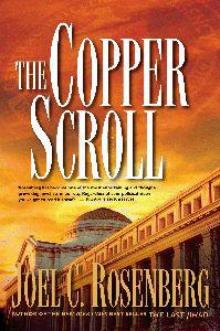 The Copper Scroll
The Copper Scroll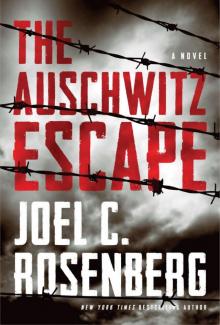 The Auschwitz Escape
The Auschwitz Escape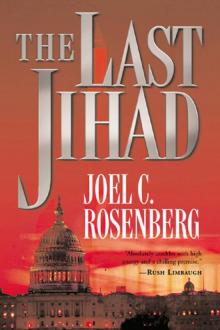 The Last Jihad
The Last Jihad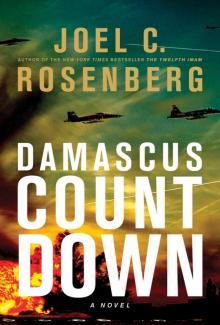 Damascus Countdown
Damascus Countdown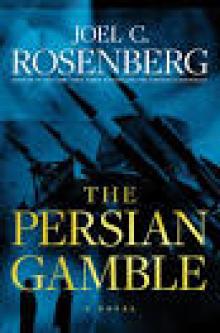 The Persian Gamble
The Persian Gamble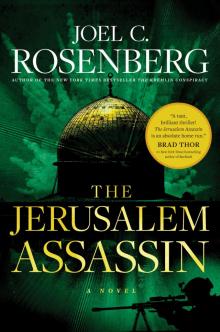 The Jerusalem Assassin
The Jerusalem Assassin Dead Heat
Dead Heat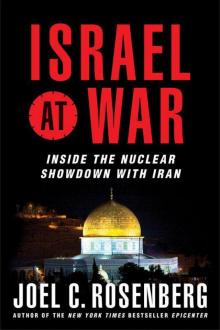 Israel at War: Inside the Nuclear Showdown With Iran
Israel at War: Inside the Nuclear Showdown With Iran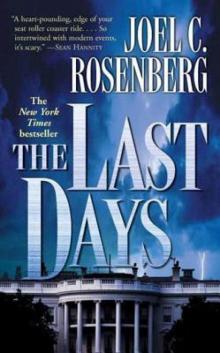 The Last Days
The Last Days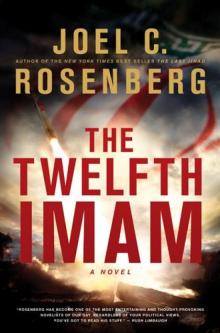 The Twelfth Imam
The Twelfth Imam Epicenter 2.0
Epicenter 2.0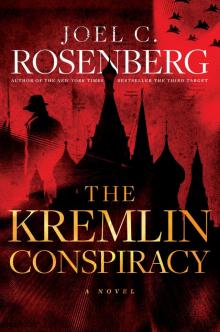 The Kremlin Conspiracy
The Kremlin Conspiracy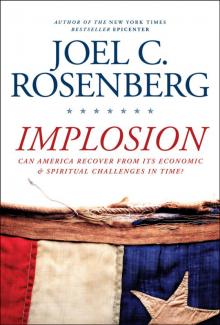 Implosion: Can America Recover From Its Economic and Spiritual Challenges in Time?
Implosion: Can America Recover From Its Economic and Spiritual Challenges in Time?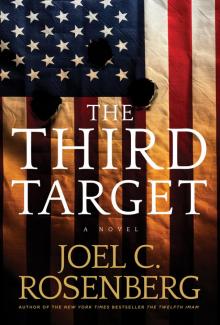 The Third Target: A J. B. Collins Novel
The Third Target: A J. B. Collins Novel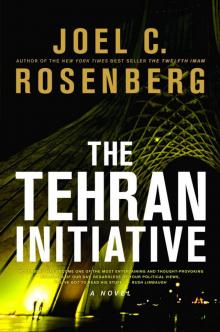 The Tehran Initiative
The Tehran Initiative Inside the Revolution
Inside the Revolution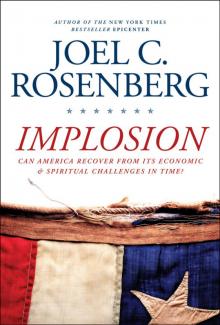 Implosion
Implosion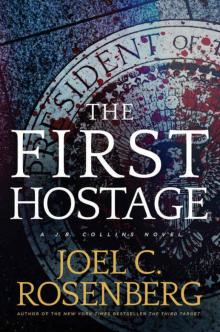 The First Hostage: A J. B. Collins Novel
The First Hostage: A J. B. Collins Novel